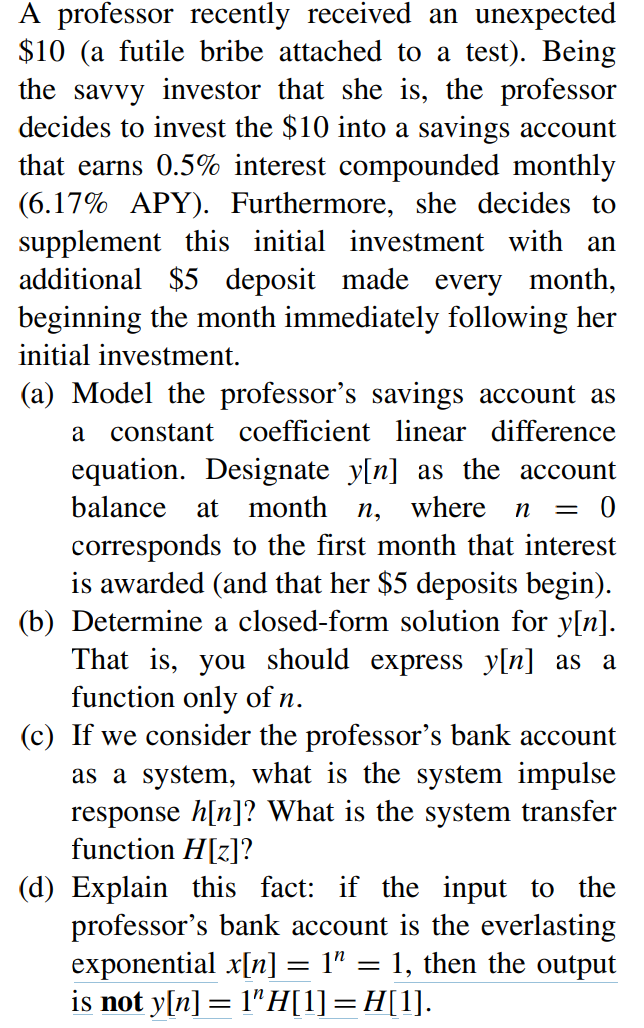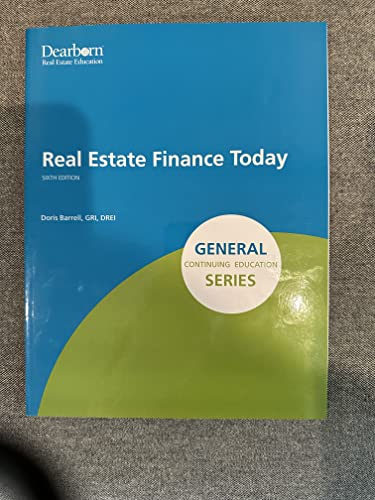Question
A professor recently received an unexpected $10 (a futile bribe attached to a test). Being the savvy investor that she is, the professor decides to
A professor recently received an unexpected $10 (a futile bribe attached to a test). Being the savvy investor that she is, the professor decides to invest the $10 into a savings account that earns 0.5% interest compounded monthly (6.17% APY). Furthermore, she decides to supplement this initial investment with an additional $5 deposit made every month, beginning the month immediately following her initial investment. (a) Model the professors savings account as a constant coefficient linear difference equation. Designate y[n] as the account balance at month n, where n = 0 corresponds to the first month that interest is awarded (and that her $5 deposits begin). (b) Determine a closed-form solution for y[n]. That is, you should express y[n] as a function only of n. (c) If we consider the professors bank account as a system, what is the system impulse response h[n]? What is the system transfer function H[z]? (d) Explain this fact: if the input to the professors bank account is the everlasting exponential x[n] = 1n = 1, then the output is not y[n] = 1nH[1] = H[1].

Please answer a-d. Thank you!.
a A professor recently received an unexpected $10 (a futile bribe attached to a test). Being the savvy investor that she is, the professor decides to invest the $10 into a savings account that earns 0.5% interest compounded monthly (6.17% APY). Furthermore, she decides to supplement this initial investment with an additional $5 deposit made every month, beginning the month immediately following her initial investment. (a) Model the professor's savings account as constant coefficient linear difference equation. Designate y[n] as the account balance at month = 0 corresponds to the first month that interest is awarded (and that her $5 deposits begin). (b) Determine a closed-form solution for y[n]. That is, you should express y[n] as a function only of n. (c) If we consider the professor's bank account as a system, what is the system impulse response h[n]? What is the system transfer function H[z]? (d) Explain this fact: if the input to the professor's bank account is the everlasting exponential x[n] = 1" = 1, then the output is not y[n] = 1" H[1]=H[1]. n, where n a A professor recently received an unexpected $10 (a futile bribe attached to a test). Being the savvy investor that she is, the professor decides to invest the $10 into a savings account that earns 0.5% interest compounded monthly (6.17% APY). Furthermore, she decides to supplement this initial investment with an additional $5 deposit made every month, beginning the month immediately following her initial investment. (a) Model the professor's savings account as constant coefficient linear difference equation. Designate y[n] as the account balance at month = 0 corresponds to the first month that interest is awarded (and that her $5 deposits begin). (b) Determine a closed-form solution for y[n]. That is, you should express y[n] as a function only of n. (c) If we consider the professor's bank account as a system, what is the system impulse response h[n]? What is the system transfer function H[z]? (d) Explain this fact: if the input to the professor's bank account is the everlasting exponential x[n] = 1" = 1, then the output is not y[n] = 1" H[1]=H[1]. n, where nStep by Step Solution
There are 3 Steps involved in it
Step: 1

Get Instant Access to Expert-Tailored Solutions
See step-by-step solutions with expert insights and AI powered tools for academic success
Step: 2

Step: 3

Ace Your Homework with AI
Get the answers you need in no time with our AI-driven, step-by-step assistance
Get Started


